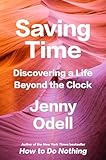Saving time : discovering a life beyond the clock / Jenny Odell.
Material type: TextPublication details: New York : Random House, an imprint of Penguin Random House LLC, [2023]Edition: First editionISBN:
TextPublication details: New York : Random House, an imprint of Penguin Random House LLC, [2023]Edition: First editionISBN: - 9780593597224
- Discovering a life beyond the clock
- BF 468 .O34 2023
| Item type | Current library | Collection | Call number | Copy number | Status | Date due | Barcode | |
|---|---|---|---|---|---|---|---|---|
 Books
Books
|
DLSU-D HS Learning Resource Center Circulation | Circulation | BF 468 .O34 2023 (Browse shelf(Opens below)) | 001204 | Available | 3SHS2019001204 |
Browsing DLSU-D HS Learning Resource Center shelves, Shelving location: Circulation, Collection: Circulation Close shelf browser (Hides shelf browser)

|

|

|

|

|

|

|
||
| BF 441 .W349 2011 Everything is obvious : once you know the answer | BF 444 .M46 2014 Brain rules : | BF 448 .G455 2005 Blink : | BF 468 .O34 2023 Saving time : discovering a life beyond the clock / | BF 503 .H893 2020 Great TED talks : innovation : an unofficial guide with words of wisdom from 100 TED speakers / | BF 531 .B696 2012 The spiritual guide to attracting love / | BF 575.A5 .F275 2011 Defusing angry people : |
Includes bibliographical references (pages 341-346) and index.
Introduction: A message for the meantime -- Whose time, whose money? -- Self timer -- Can there be leisure? -- Putting time back in its place -- A change of subject -- Uncommon times -- Life extension -- Conclusion: Halving time.
"In her first book, How to Do Nothing, Jenny Odell wrote about the importance of disconnecting from the "attention economy" to spend time in quiet contemplation. But what if you don't have time to spend? In order to answer this seemingly simple question, Odell took a deep dive into the fundamental structure of our society and found that the clock we live by was built for profit, not people. This is why our lives, even in leisure, have come to seem like a series of moments to be bought, sold, and processed ever more efficiently. Odell shows us how our painful relationship to time is inextricably connected not only to persisting social inequities but to the climate crisis, existential dread, and a lethal fatalism."--Jacket flap.
"Our daily experience, dominated by the corporate clock that so many of us contort ourselves to fit inside, is destroying us. It wasn't built for people, it was built for profit. This is a book that tears open the seams of reality as we know it--the way we experience time itself--and rearranges it, reimagining a world not centered around work, the office clock, or the profit motive. Explaining how we got to the point where time became money, Odell offers us new models to live by--inspired by pre-industrial cultures, ecological, and geological time--that make a more humane, more hopeful way of living seem possible. In this dazzling, subversive, and deeply hopeful reframing of time, Jenny Odell takes us on a journey through other temporal habitats. As planet-bound animals, we live inside shortening and lengthening days, alongside gardens growing, birds migrating, and cliffs eroding. The stretchy quality of waiting and desire, the way the present may suddenly feel marbled with childhood memory, the slow but sure procession of a pregnancy, or the time it takes to heal from injuries--physical or emotional. Odell urges us to become stewards of these different rhythms of life, to imagine a life, identity, and source of meaning outside of the world of work and profit, and to understand that the trajectory of our lives--or the life of the planet--is not a foregone conclusion. In that sense, "saving" time--recovering its fundamentally irreducible and inventive nature--could also mean that time saves us"--
There are no comments on this title.











